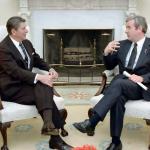Since today is the fiftieth anniversary of the Tet Offensive, some reminders of how the press covered the war and evangelicals reacted to it may be instructive for today’s religio-political theater as rendered by the mainstream press.
Arthur Herman reminds readers of how the press failed to cover the Tet Offensive accurately:
Hanoi’s decision to launch the Tet offensive was born of desperation. It was an effort to seize the northern provinces of South Vietnam with conventional troops while triggering an urban uprising by the Vietcong that would distract the Americans — and, some still hoped, revive the fading hopes of the Communists. The offensive itself began on January 30, with attacks on American targets in Saigon and other Vietnamese cities, and ended a little more than a month later when Marines crushed the last pockets of resistance in the northern city of Hue. It not only destroyed the Vietcong as an effective political and military force, it also, together with the siege of Khe Sanh, crippled the NVA, which lost 20 percent of its forces in the South and suffered 33,000 men killed in action, all for no gain.
By the end of 1969, over 70 percent of South Vietnam’s population was rated by the U.S. military as under government control, compared with 42 percent at the beginning of 1968.
The American public knew none of this, however. Almost from the moment the first shots were being fired, skeptics of the war effort in the mainstream media, including CBS News icon Walter Cronkite, would use Tet to prove that the war wasn’t being won as the Johnson administration was claiming. They went further, representing the failed attacks on the U.S. embassy in Saigon and other sites as symbols of Communist success.
To paraphrase our Lord, you will always have fake news with you.
Meanwhile, evangelicals even then had a problem with not believing the press and supporting the wrong political side (at least as some evangelical pundits and academics have it today). Here is how David Swartz described it:
Most prominent neo-evangelicals, similarly unimpressed with emerging mainline critiques of American foreign policy in the late 1960s, maintained a moderate pro-war stance, even after the Tet Offensive and troop escalations. “What special wisdom do clergymen have on the military and international intricacies of the United States government’s involvement in Viet Nam?” asked Carl Henry. “None,” was his answer. Mainliners might “speak piously about our difficulties in Viet Nam, but a vocal and uninformed piety is worse than silence.” Though misgivings grew in the early 1970s, the most prominent neo-evangelicals followed Henry’s lead. Billy Graham, Christianity Today, and the National Association of Evangelicals, three exemplars of neo-evangelicalism that were convinced of long-held theories of dominoes and containment, conceded that intervention was justified and worthy of support. (48)
The idea that evangelicals support for Donald Trump is an anomaly or a form of hypocrisy is naive. Evangelicals since the end of Wold War II took the side of unpopular and even politically incorrect policies that make many of today’s “progressive” born-again Protestants uncomfortable.
Trump’s favorability is not new. Contemporary evangelicals who think the movement was generally fine prior to the 2016 presidential contest need to reconsider.











